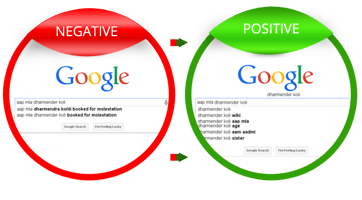Share this
Google May “Forget” in Europe, But You Shouldn’t Count On It Here
by Robert McNicholas on July 16, 2014
 A recent ruling of the European Court of Justice in Luxembourg made it possible for users to ask search engines to remove links to information that might reflect badly on their personal reputations. According to this article from The New York Times, Google and other search engines could “forget” such information after a period of time, if they are requested to. While this ruling applies to the EU rather than to the US, it does generate some examination regarding our rights as citizens.
A recent ruling of the European Court of Justice in Luxembourg made it possible for users to ask search engines to remove links to information that might reflect badly on their personal reputations. According to this article from The New York Times, Google and other search engines could “forget” such information after a period of time, if they are requested to. While this ruling applies to the EU rather than to the US, it does generate some examination regarding our rights as citizens.
One reason for this is most people use the Internet for research. This is especially true if you’re job hunting; you use the Internet to learn about your prospective employer, and it’s a good bet that your prospective employer’s HR department is using the Internet to find out about you.
In the United States, the First Amendment guarantees freedom of speech and press. Therefore, it doesn’t seem likely that the US Supreme Court will be following in the EU’s footsteps. So how can you safeguard your privacy? And what about protecting your business’s reputation online?
4 Ways to Protect Your Reputation Online
The responsibility to protect your privacy and reputation falls squarely on your own shoulders. While there are things we probably all wish we could un-say or delete from someone’s memory of us, it’s basically not possible— especially for the Internet. Although you may be able to remove embarrassing pictures and comments from your Facebook wall, you may not be able to undo all of the damage. That leads us to the first rule in safeguarding your privacy online: don’t post yourself being stupid.
Let’s discuss all four steps in detail.
- Think before you post, tweet, or comment. Imagine your social media accounts as billboards. Unless you’re comfortable with something being broadcast throughout your home, city, or state, don’t post it. This means private information,
 potentially sensitive data, and embarrassing pictures. (And do the same for your friends. You never know who may be looking at their sites.)
potentially sensitive data, and embarrassing pictures. (And do the same for your friends. You never know who may be looking at their sites.) - Be proactive. From time to time, Google yourself and see what comes up. After all, this is how most people will be finding out about you. Although you may not be able to alter search results, at least you can be forewarned and forearmed if anything embarrassing shows up. If there’s a factual error about you on a blog or some other site, you can contact the owner and ask for it to be removed.
- Create your image. Because social media sites tend to rank high in search results, experts recommend that you have an active social media presence. Keep tabs on what you post and on the comments you receive. Facebook, LinkedIn, and Twitter tend to be the most visited and valuable avenues for creating a positive search engine footprint.
- Consider your options. Although web browsers come with a Do Not Track option, this is more of a suggestion than a requirement. In fact, for many browsers, the user must select this feature to enable it. You may want to use third-party software and browser add-ons to minimize who can see what you do online. For some excellent suggestions, see this information from journalist Julia Angwin.
There’s an old saying that if you want something done right you have to do yourself. When it comes to protecting your online privacy and reputation, that’s true.
Note: for an in-depth look at protecting your online privacy, see this article from Forbes.com. Business owners or managers may want to consider this article as well.
Share this
- Featured (119)
- Best Practices (76)
- Business (66)
- Small Business (66)
- Security (37)
- Managed Services (29)
- Business Growth (27)
- Technology News (26)
- Google For Work (22)
- it support (15)
- Social Media (13)
- Technology (11)
- Google (9)
- Malware (9)
- News (9)
- Cloud (6)
- seo (6)
- Backup Storage (5)
- Website (5)
- Communication (4)
- Productivity (4)
- Research (4)
- Analytics (3)
- Ransomware (3)
- Technology Support (2)
- Windows (2)
- anti malware (2)
- email (2)
- how to (2)
- laptops (2)
- mobile (2)
- Hubspot (1)
- twitter (1)
- April 2024 (1)
- March 2024 (2)
- November 2022 (3)
- October 2022 (1)
- September 2022 (3)
- August 2022 (3)
- December 2021 (3)
- November 2021 (3)
- October 2021 (1)
- September 2021 (3)
- August 2021 (3)
- July 2021 (1)
- March 2021 (1)
- February 2021 (7)
- January 2021 (1)
- March 2020 (1)
- August 2019 (1)
- April 2019 (4)
- March 2019 (6)
- December 2018 (10)
- November 2018 (10)
- August 2018 (1)
- July 2018 (9)
- June 2018 (4)
- May 2018 (4)
- October 2017 (3)
- September 2017 (6)
- August 2017 (6)
- July 2017 (12)
- June 2017 (12)
- May 2017 (3)
- March 2017 (5)
- February 2017 (2)
- August 2016 (2)
- June 2016 (4)
- January 2016 (1)
- December 2015 (3)
- November 2015 (3)
- October 2015 (3)
- September 2015 (3)
- August 2015 (2)
- July 2015 (4)
- June 2015 (3)
- May 2015 (2)
- April 2015 (1)
- March 2015 (1)
- February 2015 (1)
- January 2015 (2)
- November 2014 (4)
- October 2014 (11)
- September 2014 (5)
- August 2014 (6)
- July 2014 (7)
- June 2014 (8)
- May 2014 (3)
- April 2014 (3)
- March 2014 (2)

